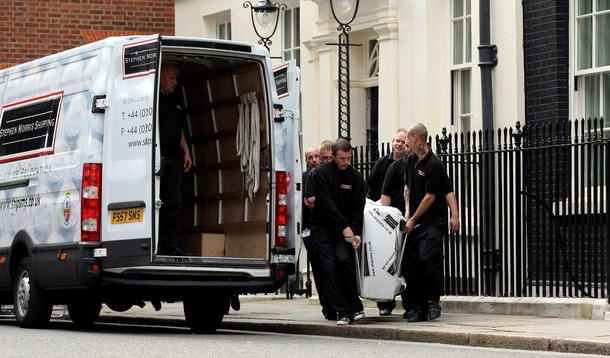
In American presidential elections, held on the Tuesday after the first Monday in November, the new president is sworn in at noon on January 20 and he has his full team in place in, oh, two years. In the UK, the transition customarily takes place quite literally overnight and, when it takes a whole week — as it did this time, as a hung parliament required negotiations to resolve — people are peeved.
We could learn something from our British cousins. But, alas, their secrets likely won’t work here.
As Foreign Policy assistant editor David Kenner explains, the Brits do it partly
By relying on a powerful and apolitical permanent bureaucracy. Unlike in the American political system, Her Majesty’s civil service is entrusted with substantial responsibilities for implementing the agenda of the party in power. And because the new British prime minister appoints only a very small group of people in the upper echelons of government, the transition can be accomplished speedily.
In the run-up to an election, the bureaucracy goes into what’s informally known as "purdah" mode, when it ceases initiating controversial new initiatives that could open it up to charges of bias. It also scours the major parties’ manifestos and confers with opposition politicians to gain a sense of their priorities. Armed with this information, the civil service draws up an agenda that can be implemented as soon as the new prime minister crosses 10 Downing St.’s threshold.
Britain has no equivalent to the grueling U.S. confirmation system for high-ranking government officials, which also speeds up the process. Cameron may suffer negative political consequences for appointing an unpopular minister, but he has the authority to choose whomever he desires. The British tradition of shadow governments also removes much of the suspense from internal party wrangling over key ministerial positions.
The UK operates, as do most Western democracies, on a parliamentary system. But that’s really a misnomer, especially in the British case. Really, they have Cabinet government, with the House of Commons operating as a rubber stamp in most instances.
While America has its separation of powers and checks and balances, the UK has unity of powers and what the prime minister wants, goes, except under very unusual circumstances.
Under such a system, it’s relatively easy to line all the ducks up in a row in advance of the election. The leader of the party that wins the election will be prime minister and the rest of the ministers are set in advance. Indeed, they operate as a government-in-waiting. This go-round, because the Tories fell a few seats short of an outright majority, it was necessary to accommodate a handful of senior Liberal Democrat MPs.
None of this is possible in the US. Presidents run as standalone candidates in the party primaries, ultimately pairing up with a vice presidential running mate for the general election. While it’s possible to have some idea of who one wants in place, the extended nature of the campaign makes it difficult to nail down, as the incentive is to put all of one’s energies into winning the office. Meanwhile, all 435 members of the House of Representatives and a third of the Senate are running for re-election as separate candidates, with the party banner mostly an organizing device rather than a firm commitment to a platform.
Article II, Section two of the Constitution provides the president "shall nominate, and by and with the Advice and Consent of the Senate, shall appoint Ambassadors, other public Ministers and Consuls, Judges of the supreme Court, and all other Officers of the United States." In the early days, the latter involved a mere handful of cabinet secretaries but, alas, over time this has evolved into the appointment of 4000-odd people. Even if the Senate was inclined to give utmost deference to the president and avoid petty political games — and, rest assured, it is not — even cursory examination and voting would take quite some time to accomplish.
It is, many agree, a process that has gotten out of control. Even though President Obama has been exceedingly careful to pick candidates unlikely to arouse ire — so much so that many members of his own party are irritated by how few true Progressives he’s picked — he still had key vacancies in major economic and security posts for months while having to manage a global economic meltdown and two shooting wars.
There is, theoretically, a way out. The same section that requires the Senate to confirm officers appointed by the president allows that " the Congress may by Law vest the Appointment of such inferior Officers, as they think proper, in the President alone, in the Courts of Law, or in the Heads of Departments." Congress is quite unlikely to actually do it, for a variety of institutional reasons, but they could simply decide that they can confine their confirmation power to the most senior levels. They would still, after all, retain oversight power over the rest.
Even better would be to take a page from the British book and simply decide that, below the top policy-makers, it simply makes no sense to politicize so many positions. We’d likely be much better served to simply put, oh, 3000 of the jobs currently appointed by the president into the Senior Executive Service and run on a merit basis.
Absent a move to a parliamentary system — which I wouldn’t recommend for a continental power with our regional, cultural, and ideological diversity— we’re never gone to have a system whereby the winner of the presidential election shows up the next day at the White House and gets to work. But it’s theoretically possible that we could set things up so that the new president would have his team in place by the time he’s sworn in two-and-a-half months later.
James Joyner is managing editor of the Atlantic Council. Photo credit: Getty Images.
Image: moving-van-10-downing.jpg
